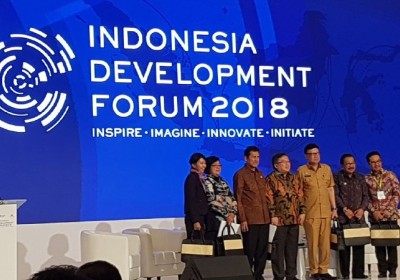IDF 2018: Governor Soekarwo and Bupati Hasto Hold Sharing Session on Drinking Water Innovations
July 10, 2018
Speakers of High Level Talkshow of IDF 2018 in photo session with the Minister of National Development Planning/Head of Bappenas, Bambang Brodjonegoro. Bupati (District Chief) Hasto and Governor Soekarwo stand first and second from the right.
IDF 2018: Governor Soekarwo and District Chief (Bupati) Hasto Presenting Drinking Water Innovation. Jakarta, July 10, 2018 - The Governor of East Java, Soekarwo, and Bupati of Kulonprogo, Hasto Wardoyo, were present as speakers in the High Level Talkshow of Indonesia Development Forum 2018 in Jakarta, Tuesday, July 10, 2018. Both sub-national heads shared about similar topics, which were regarding innovative solution for regional drinking water.
“The construction of Umbulan drinking water facility, which had been postponed for decades since Dutch colonial time, was finally accomplished thanks to local’s innovation,” Pakde (Uncle) Karwo, as he is addressed by many, explained.
The construction of Drinking Water Provision System (SPAM) of Umbulan, Pasuruan District, was finally accomplished with collaboration between sub-national government, sub-national government-owned enterprise (BUMD), and private sector. The project took a total investment of IDR 4.51 trillion to construct water treatment plant, transmission, offtake, reservoir, and distribution network in five districts/cities: Pasuruan District, Pasuruan City, Sidoarjo District, Surabaya City, and Gresik District.
The SPAM Umbulan project is equipped with 4,000 liters per second capacity, with raw water flowing from Umbulan water spring which is located in Umbulan Village, Winongan Sub-district, Pasuruan District, which is channeled through clean water transmission pipeline stretching 93 km long. The cooperation in SPAM Umbulan system does not only cover its funding, but also managerial aspects. As a result, Soekarwo continued, the public now enjoys cheap and quality drinking water at the price of IDR 2,400 per meter cubic, and IDR 1,050 per meter cubic for Pasuruan City. Whereas, had it been funded by “red-plate” (government-owned) agency, it would have been sold at no less than IDR 7,000 per meter cubic.
“The Umbulan drinking water’s price and quality is the second best in the world,” Pakde Karwo explained.
Rather different from the innovation from its counterpart in northern part of East Java, which applied private partnership, another innovation emerged from Kulonprogo District. The district has been producing its own packed drinking water. According to the Bupati of Kulonprogo, Hasto Wardoyo, the idea came up from their concern upon observing the massive use of packed drinking water in the district.
“As many as 6 million glassed water was consumed by Kulonprogo residents every month,” Hasto explained.
The packed water, however, was produced by other regions. Whereas, abundant water spring was available in Clereng area, Sendangsari Village, Pengasih Sub-district, Kulonprogo. Previously, water from Clereng was used only for PDAM (Government Water Company) customers.
Being determined to achieve economic independence, Hasto assigned the Head of PDAM of Kulonprogo to produce their own packed drinking water since the past three years. The goal was accomplished with the production of packed drinking water they named AirKu (Air Kulonprogo/Kulonprogo Water). Up to date, AirKu has been consumed at the rate of 2 million glasses per month.
“We have also signed an MoU with Angkasa Pura to supply AirKu at the Kulonprogo International Airport area,” said Hasto.
These cutting-edge innovations from various sub-national governments are some of the success stories showcased in the Indonesia Development Forum 2018. IDF 2018 is held by the National Development Planning Agency (Bappenas) with the support of the Government of Australia through Knowledge Sector Initiative (KSI). IDF 2018 promotes a more equal and sustainable development acceleration in Indonesia that is based upon science, relevant experiences, and facts. The results will be used as a reference to develop the Mid-Term Development Plan of 2020-2024.**
Indonesia’s Research Institutions Supporting the Development of the Electric Vehicle Industry
Indonesian Muslim Fashion and Cosmetics IKMs Shine at Dubai World Expo 2020
Govt Steps Up UMKM Transformation Efforts in the Midst of Pandemic Slowdown
Govt Encourages Promotion of IKM Products in Digital Era
Government Begins Developing Maritime Training Center in Makassar
Tweets by IDDevForum
